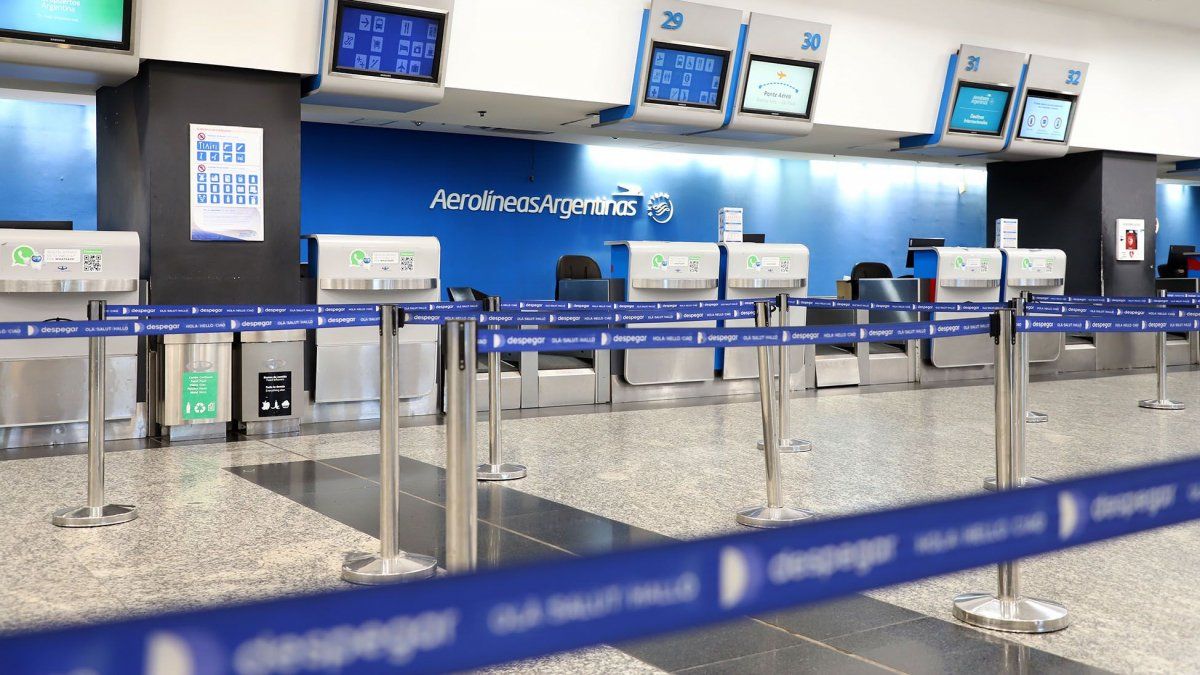The statement released in the last few hours is signed by representatives of the Association of Airline Pilots (APLA), the Union of Senior and Professional Personnel of Commercial Aerospace Companies (UPSA), the Argentine Association of Flight Attendants (AAA) and the Association of Aeronautical Personnel (APA).
“The Ministry of Human Capital, through a statement released yesterday, has reported that it will regulate the essentiality of the aeronautical service “commercial to guarantee minimum services,” the document begins. The text then states that “Such a task would result in an arbitrary and illegal decision.compromising the administrative and criminal responsibility of the officials who participate in it.”
They then detail the reasons for this argument explaining that Transport is already regulated as a “public service” of transcendental importance, under the conditions established by the norm, in accordance with the regulations of the right to strike, constitutionally recognized by law 25,877.
“The attempt to use an unconstitutional shortcut: the DNU70/23, so that through the Aeronautical Code, they try to establish a different and particular procedure for air transport, It would be void for two reasons“the unions said. On the one hand, because the DNU itself is null and void “as declared by the Chamber of Labor” and, furthermore, because “the only way to regulate the right to strike “is by modifying the law that regulates it.”
They then pointed out that, according to Article 24 of Law 25,877 and its regulations, Decree 272/06, following the principles of the ILO, which determines that “only through a Guarantees Commission, made up of experts, can a public service of transcendental importance, such as transportation, be declared an essential service.”
In that sense, they then stated that “Any administrative act issued outside the established legal regime, in addition to being null and illegal, constitutes an excess of power, an abuse of authority and a violation of the duties of the public official who issues it (art. 248 of the Penal Code)”.
They also denounced that in the specific case of air transport, in the context of the current conflict over salary negotiations, the illegality “is even more evident, and the responsibility of the officials is more pronounced”, for a series of reasons.
Unions reject the declaration of commercial air service as “essential”
First of all, because in relation to Aerolíneas Argentinas, The Government “would act in its dual capacity as regulator and employer, violating the obligation to maintain procedures between the parties that guarantee impartiality”according to ILO Convention 151. Otherwise, the company “would be taking advantage of a preferential position arising from its status as a public enterprise, administered and directed by officials appointed by the government.”
Secondly, they point out that “the only function of the State, in the case of Ministry of Human Capitalthrough its Secretary of Labor, is to try reconcile collective conflicts“. Despite this, they claim that the Government did not seek to reconcile “despite its legal obligation, to try to reach an agreement.”
At the same time, they questioned the fact that official statements and declarations by officials “pressuring in the context of the conflict” and “threatening to limit constitutional rights” represent “injuries incompatible with the validity of the same.”
“In the particular case of public official involved, the Secretary of Labor, there are some more decisive elements of the risk that he would incur by putting his signature on acts of the aforementioned illegality“, they warned, given that “not only has he been a representative of the employer sector and a frequent participant, in that capacity, in the ILO conferences, from which, as noted, the principles regulating the right to strike in Argentina were taken, but he has also been a member of the Guarantees Commission, also representing employers, which is responsible for implementing, where appropriate, minimum services in essential services.”
Therefore, the unions assured that “the accusations that would apply to said official, would be a concurrence of causes so determining of the illegality and the crime as: A- Knowingly participating in the regulation and/or application of limitations to the strike outside the current legal framework; B- Violating the impartiality of the State in conflicts in which the State itself is a party as an employer; C- Failing to comply with the obligation of the Guarantees Commission to operate, provided for in Decree 272/06; D- Violating Law 14,786, having completely omitted the function of promoting the conciliation of collective conflicts, intervening only to prohibit the strike in the respective period.”
Finally, they warned that They are “in time to prevent the consummation of the illicit act”recognizing the current legal framework and guaranteeing the constitutional right to strike in accordance with the regulations that govern it.”
Source: Ambito




